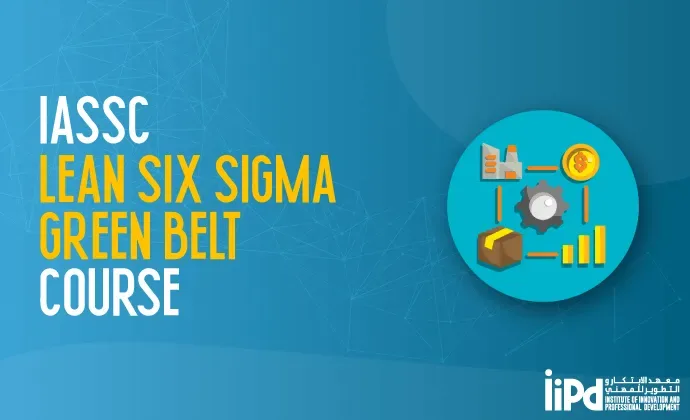
Course Details
In today's competitive landscape, Riyadh businesses face the constant pressure to deliver exceptional quality while controlling costs. Six Sigma offers a proven methodology to achieve both, allowing companies to reduce product or service failure rates to a minimum. At IIPD Global, we help you unlock the power of Six Sigma and propel your business to new heights.
Understanding Six Sigma:
- Reduced Defects, Enhanced Profits: Six Sigma companies typically invest less than 5% of their revenue in addressing quality issues, translating to significant cost savings and increased profitability.
- Holistic Approach: Six Sigma encompasses all aspects of your business, from management and design to production and customer satisfaction.
- Flawless Execution: This methodology demands a culture of continuous improvement, ensuring near-perfect execution of key processes.
- Improved Process Capability: By minimizing process variation, Six Sigma allows you to focus on enhancing overall process capability.
- World-Class Quality: By implementing Six Sigma, you can strive for consistent delivery of the highest quality products and services, giving you a competitive edge.
Who Should Attend
The course is intended for staff, supervisors, and managers in all vocational work areas where objectives need to be controlled and deviations to be analyzed for improvement to achieve more efficient and effective results.
Course Objectives
- Application of Six Sigma; Six Sigma tool kit to deploy
- Value-stream process mapping; tracking process defects
- DPU, DPMO, and Sigma-level exercise
- Statistical process control, principles and applications
- Variable control charts, attribute control charts
- Discipline problem solving
- Identifying and verifying the root cause
- DMAIC Methodology -Define, measure, analyze, improve, and control DMAIC checklists
- Failure mode and effects analysis
Learning Outcomes
- Quality function deployment (QFD)
- Supply base and material management
- Information and technology sharing
- Benchmarking
- Balance scorecard
- Traditional management vs. Lean Six Sigma management
- Six Sigma benefits to an organization
- More on DMAIC Methodology
Prerequisites:
There are no formal prerequisites for this course, but a basic understanding of business processes and statistical concepts will be helpful.
Course Outline
Let's take a closer look at the modules and topics that will guide you on your path to becoming a Lean Six Sigma Green Belt practitioner.
Module 1 – Introduction to Six Sigma
- Why Six Sigma?
- Definition of Six Sigma
- Comparisons between typical TQM and Six Sigma Programs
- Origins and Success Stories
How to Deploy Six Sigma
- Leadership Responsibilities
- Description of the Roles and Responsibilities
- Data-driven Decision Making
- Six Sigma metrics – DPU and DPMO
Module 2 – Define Stage
- DEFINE: Project Definition
- A. Tasks
- B. Work Breakdown Structure
- C. Pareto Diagrams
- D. Project Charters
- E. Prioritization Matrix
- DEFINE: Change Management Teams
- Problems with Change
- Stages of Team Development
Module 3 – Measure Stage
- MEASURE: Tools and Objectives
- Measure Stage Objectives
- Flowcharts
- Process Maps
- SIPOC
- MEASURE: Establishing Process Baseline
- Benefits of Control Charts
- Requirements vs. Control
- Control Chart Interpretation
- MEASURE: Process Capability
- Histograms
- Scatter Diagrams
- Probability Plots
- Capability and Performance Indices
Module 4 – Analyze Stage
- ANALYZE: Introduction to Linear Regression Analysis
- Descriptive Statistics
- Sampling and Central Limit Theorem
- Hypothesis testing
- Linear Model
- Interpreting the ANOVA Table
- Overview of Multiple Regression Tools
- IMPROVE: Tools and Objectives
- Improve Stage Objectives
- FMEA
- Correlation
- Testing Variances
- Testing Means
Module 5 – Deployment
- CONTROL: Tools and Objectives
- Control Stage Objectives
- Control Plans
- Training
- ANALYZE: Lean Thinking
- Definition of Waste
- Analyzing Process for NVA
- Standardization
- 5S
- Kanban
- Poka Yoke
Conclusion
In a fast-paced and competitive business environment like Riyadh, organizations must constantly seek ways to optimize quality and performance while reducing costs. Six Sigma provides a strategic, data-driven approach to achieve this balance, empowering businesses to minimize defects, streamline operations, and deliver exceptional value to customers.
This comprehensive Six Sigma training offered by IIPD Global equips professionals with the essential tools, methodologies, and mindset to drive process excellence through the DMAIC framework. From project definition and statistical analysis to improvement strategies and control mechanisms, participants will gain hands-on expertise to make measurable, sustainable improvements in their organizations.
Whether you're a manager, supervisor, or team member, mastering Six Sigma principles will enable you to lead with precision, make informed decisions, and foster a culture of continuous improvement. By integrating Lean thinking and Six Sigma tools, you'll not only enhance operational efficiency but also position your organization for long-term success and global competitiveness.








